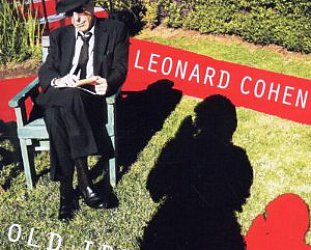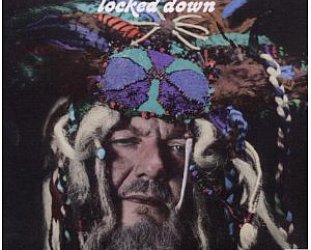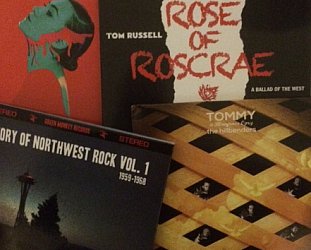Graham Reid | | 1 min read
Scott Walker: See You Don't Bump His Head

Some musicians are revered, reviewed and written about, but rather less listened to. Put Scott Walker at the top of that list.
This is only his fourth album in the past three decades and their abstruse lyrics, electronic effects and often declamatory tone have nothing in common with his acclaimed ballad style in the Walker Brothers and on a series of orchestrated solo albums in the 60s.
This dramatic collection – Walker speak-singing like he's in some demented opera – opens with an urgent electrobeat and works around the refrain “while plucking feathers from a swan song”, Corps de Blah starts as a quivering a cappella piece (“I'm bumping into leghorns in the darkness”) with what sounds like a dog barking and flatulence later on, and the centre-piece is a 21 minute piece entitled SDSS14+13B (Zercon, A Flagpole Sitter).
Many people will find this largely unlistenable because it is such unfamiliar territory, and yet . . .
The way in to Walker's recent music goes like this: the words he uses aren't really vehicles for meaning in many cases, he simply enjoys the sound of them and their weird associations (like I am the Walrus, so there's not a lot of clear "story"). And when it comes to music he is more a sonic experimenter than a man who is going to offer you something to whistle along with.
The 10 minute Corps De Blah for example weaves through separate phases of low and high drama, and it sounds more like a contemporary opera where screens and characters add another dimension (no more helpful however).
On Phrasing, Walker enjoys the phrase "pain is not alone" delivered in many variations from the sad and broken to the raw and angry. It is the closest thing to a "song" here although with the final words "here's to a lousy life" it isn't going to pop up on your radio.
Large parts of this are a cappella (there are long silences at the start of SDSS1416etc) and the electronica punctuations, disembodied voices and strange atmospherics can add to an already disconcerting feeling. Walker is intent on keeping you on the edge of your seat . . . and he does. Dimple is just plain chilly.
The final song The Day the “Conducator” Died is something to do with Romanian dictator Nicolae Ceausescu (which continues an interest in dictators, Mussolini and his mistress appeared on his previous The Drift album).
Lyrically it's almost unfathomable (“To play
fugues on Jove's Spam castanets”?) although it's hard to tear
yourself away from its sense of desperation and despair – unless by this time you just have to flee.
Whatever you make of Scott Walker here's an ironclad guarantee about this album.
You won't have heard anything like it this year.
Or in any year.







post a comment